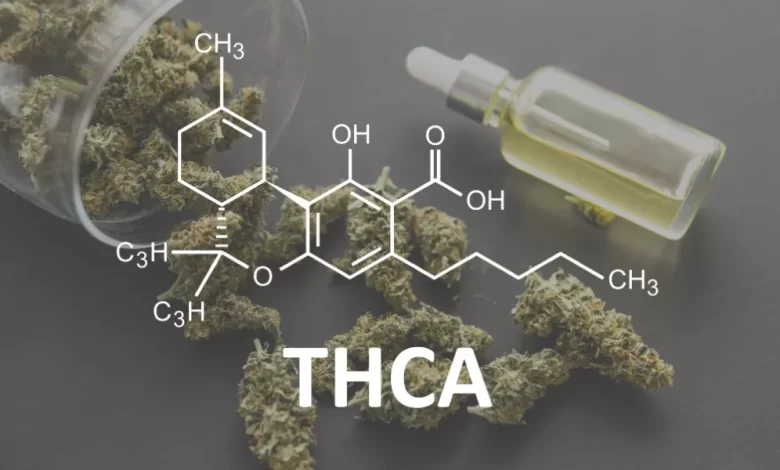
THCA, short for Tetrahydrocannabinolic acid, is a non-psychoactive cannabinoid present in raw cannabis plants. When smoked or vaporized, THCA converts into THC (tetrahydrocannabinol) due to heat. THCA has received increased attention in recent years from the cannabis industry, mostly due to its potential medicinal benefits. While there is a lot of buzz around THCA, the information about the compound is relatively limited. In this article, we will provide a comprehensive overview of what THCA is, its potential benefits, and how it works.
THCA or tetrahydrocannabinolic acid is a non-intoxicating compound commonly found in cannabis plants. It is the precursor to THC or tetrahydrocannabinol, which is a psychoactive component of the cannabis plant responsible for the majority of its medical and recreational benefits. As more research is conducted on the benefits of cannabis, THCA is becoming increasingly popular among medical cannabis patients, natural health enthusiasts, and researchers alike. In this article, we will take a comprehensive look at THCA and its therapeutic potential while debunking some common misconceptions around its use.
What is THCA?
THCA is one of the primary cannabinoids found in cannabis plants. It is a natural and non-psychoactive compound that converts to THC when heated, aged or decarboxylated. In its raw form, THCA is present in high amounts in fresh cannabis plants, and it has a range of therapeutic effects. THCA has a unique crystalline structure, which makes it easier for our bodies to digest and absorb.
The Benefits of using THCA
Medical researchers are investigating THCA and its potential benefits for patients with a variety of health conditions, including chronic pain, cancer, and neurological disorders like epilepsy. Pre-clinical research has suggested that THCA may be a potent anti-inflammatory agent, and that it may help to combat the spread of cancerous cells. Additionally, THCA may help to reduce nausea, calm muscle spasms, and promote a sense of relaxation.
Debunking the Myths around THCA
One of the most significant myths around THCA is that it can be smoked or vaporized for a psychoactive effect. However, as we have established, THCA is non-intoxicating, and it does not convert to THC until it has been heated or aged. This same principle applies to the consumption of raw cannabis. Consuming raw cannabis does not have psychoactive effects, and it may even be supportive of gut health.
Methods of THCA Delivery
The most popular way to use THCA is through tinctures, edibles, and oils. These products are generally made by decarboxylating the raw cannabis material and extracting the THCA. Patients that are looking for a sustained effect can benefit from incorporating THCA infused tinctures or oils into their daily routine. THCA is also available in capsule form for those that prefer their supplements in this format.
The Future of THCA
As research is conducted on THCA and other non-psychoactive cannabinoids present in cannabis, the future of cannabis as a therapeutic agent is becoming clearer. The medical and recreational benefits extend beyond the psychoactive component of cannabis, and patients are increasingly exploring the use of THCA and other non-psychoactive cannabinoids. The potential applications are widespread, with potential benefits for chronic pain, inflammation, cancer, epilepsy, and more.
THCA is non-psychoactive, which means it does not produce the euphoric high associated with THC. When a cannabis plant is fresh and undried, it contains high levels of THCA. It is only when heat is applied to the plant, such as through smoking or vaporization, that THCA is converted into THC. THC is responsible for the “high” that users experience when consuming cannabis.
THCA is believed to have several potential medicinal properties. Some studies have suggested that it can relieve symptoms of inflammation, nausea, and vomiting. Additionally, THCA has antispasmodic and anticonvulsant properties that could help patients suffering from seizures, muscle spasms, and convulsions. There is also ongoing research on the potential of THCA for the treatment of cancer. Finally, THCA is believed to have neuroprotective properties, which means it could help in the prevention of neurodegenerative diseases such as Alzheimer’s and Parkinson’s.
A vital difference between THC and THCA is that, unlike THC, THCA is not intoxicating. It means that patients can consume THCA without experiencing any mind-altering effects. THCA is available in various forms, including tinctures, capsules, edibles, and topicals. Patients suffering from conditions where mental clarity is essential, such as anxiety or work-related stress, can benefit from taking THCA.
THCA interacts with the body’s endocannabinoid system, just like THC. However, the two compounds have different modes of action. THC interacts with the CB1 receptor, a protein in the brain that regulates mood, appetite, and pain sensations. THCA, on the other hand, does not interact with the CB1 receptor directly but instead interacts with other proteins, including enzymes, neurotransmitters, and receptors.
THCA’s therapeutic value is better preserved when consumed raw, as when the cannabis plant is heavily processed, it reduces THCA’s efficacy. Additionally, cooking cannabis at high temperatures, such as in edibles, can convert THCA to THC. So, if you intend to use THCA for its therapeutic effects, it is best to take it in its raw form.
Conclusion:
THCA is an exciting cannabinoid that has garnered interest in recent years due to its potential medicinal benefits. While research into the compound is still ongoing, preliminary studies suggest that it may help alleviate inflammation, stop seizures, and protect against neurodegenerative conditions. THCA interacts with the endocannabinoid system and does not induce any intoxication, making it an appealing treatment option for patients seeking therapeutic benefits without the mind-altering effects of THC. Furthermore, consuming THCA in its raw form is best to preserve its efficacy. With further research underway, THCA has the potential to emerge as an appealing option for patients looking for an alternative to conventional medicine.
In summary, THCA is a non-intoxicating cannabinoid present in cannabis plants that have a range of therapeutic benefits. It is an increasingly popular supplement for those looking to support their overall health and well-being. As research continues, it will be interesting to see the applications for this unique compound and the impact that it may have on the medical community.
Hashtags: #Understanding #THCA #Comprehensive #Overview
Stay Tuned with gyanipoint.com for more Business news.



